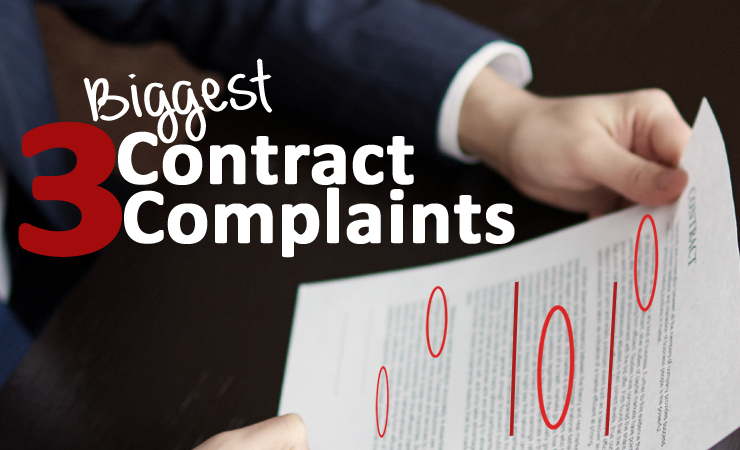What You Should Know: Common Complaints Shared by Businesses Regarding Telecom and Utility Contracts
When was the last time you signed a contract for telecom or any other utility service? Did you find the experience overwhelming because of the many contract options, terms, clauses, restrictions, usage regulations, discounts, promos and add-ons? Then once that contact was signed and your monthly billing occurred were the terms you agreed to accurate? Contracts are not always a smooth process and many business consumers are not satisfied with the terms, the charges, the clauses, the errors in billing and much more.
Here are 3 of most common complaints businesses have shared;
1. Confusing Charges
Confusing charges on telecom and utility bills is a frequent complaint. In telecom, a report by the Commissioner for Complaints finds businesses stating they weren’t given discounts or credits promised or their contracts didn’t reflect the services they thought they were getting. In fact, 75% of organizations believe they have errors in utility bills.
Example of Confusing Charges may include;
- Unauthorized charges: These are typically charges for taxes and regulatory fees. Because these fees are not part of the initial contract it is difficult to question their accuracy and validity, so most consumers pay for these charges without any question.
- Multiple Telecom Billing Systems: One of the main reasons for difficulty in businesses understanding a telecom invoice is that telecom carriers have different billing systems for their many different services. Each service can be billed at different rates, with different terms and different discounts. Many businesses require many telecom services to run effectively. But tracking billing rules that apply to each is very difficult.
- Variety of Telecom Billing Rates: Telecom service providers charge a list price “base rate”, for service. Discounts are usually applied but can be hard to follow if applied correctly. Sometimes the discounts are never applied or inaccurate.
- Fluctuating Rates: This occurs when the discount is fixed for the term of the contract, but the monthly charges are not fixed.
2. Billing Errors
The number one complaint from business consumers is routine billing errors. Billing errors can occur for many reasons including;
- Being billed for disconnected services.
- Billed for services that belong to another customer.
- Usage in excess of your plan allowances (paying for premium rates for those services above and beyond your plan).
- Usage far below your plan allowances (paying for services you not use).
- Being billed on multiple accounts by the same vendor (applies to large companies with multiple accounts).
- Choosing the most popular plan (it may not be the best solution for your organization).
- Being billed for services on outdated plans (technology changes quickly – check to make sure you are not paying more than what you need to be on an outdated plan).
- Billed for services not under contract (you may be paying for services that were not in your original contract).
Businesses should review charges, understand why the charge is relevant or not relevant, and question or dispute charges that are not accurate for the services that are needed. Over 80 percent of telecom invoices contain errors, but because it takes too much time to clearly identify those errors they go unnoticed. 75% of utility invoices contain errors.
3. Clauses in Business Consumer Contracts
Another complaint is clauses in contracts, known as TERMS OF SERVICE. This may include things like;
- Early Termination Fees: No “out” clauses.
- No Business Flexibility: In the event of a business change, i.e. merger with another company, the flexibility to make contract changes to adapt to accommodate the business changes.
- Missing Service-Level Agreements (SLA): The purpose of a network is to get business traffic from point A to point B reliably, securely and in a timely manner. All too often, the carrier doesn’t commit to doing any of the above. SLA’s ensure they do – or the service provider be held accountable.
- Poor Account Management: Too few contracts provide recourse for poor account management. Customers should have a say in how their contract is managed and the service level that is received.
- Technology Lock-in: Some contracts require a termination penalty when the consumer wants to shift from an older technology to a newer one. As long as you are buying services from the same provider, contracts shouldn’t lock you in to a particular technology.
- Long Contracts: Many organizations agree to long contract terms, in hopes of avoiding contract negotiations for as long as possible. Keep contracts short (3 or less years).
- Inaccurate or incomprehensible billing: Service providers should be responsible to accurate billing. Businesses should review and contest any inaccuracies for credit.
Contracts while not something businesses enjoy having to understand, negotiate and agree to, they are necessary to provide an agreement of services between business consumers and service providers. However, business consumers have every right to question the terms and make the appropriate adjustments to ensure accurate charges and best solutions are met.
Understanding contracts is crucial for business consumers. The bottom line is… Negotiating a solid contract can pay big in return now and in the future.
If you have questions regarding your telecom, utility or vendor contracts and agreements and would like a FREE CONSULTATION contact LIMITLESS Nationwide: 866-504-4050.




